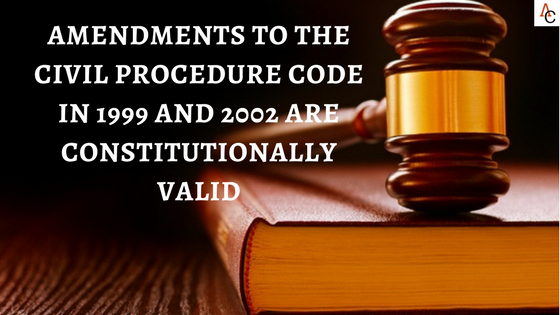Aapka Consultant Judgment Series- In this series, we are providing case analysis of Landmark Judgments of Hon’ble Supreme Court of India.
Salem Advocate Bar Association Vs. Union of India (UOI)
AIR2003SC189, (2003)1SCC49
Hon’ble Judges/Coram: B.N. Kirpal, C.J., Y.K. Sabharwal and Dr. Arijit Pasayat, JJ.
Date of Decision: 25.10.2002
FACTS:-
These writ petitions have been filed seeking to challenge Amendments made to the Code of Civil Procedure by the Amendment Act 46 of 1999 and Amendment Act 22 of 2002.Even though no submission to the effect that any of the provision in the Act are in anyway ultravires of the Constitution or lacking in legislative competence, attention of the court was drawn to some of the amendments which have been made with a view to show that there may be practical difficulties in implementing the same. It was submitted that clarifications may be necessary in implementing those provisions.
ISSUE:-
- Whether the amendments made in the Code of Civil Procedure, 1908 by the Amendment Act of 1999 and 2000 were constitutionally valid?
JUDGMENT:-
Court’s attention was first drawn to the amendment made in Section 27 dealing with summons to the defendant. In Court’s opinion, the said provisions read as a whole will not be susceptible to the meaning ascribed by the Counsel for the petitioners. The Court said that the words added by amendment, it appears, fix outer time frame, by providing that steps must be taken within thirty days from the date of the institution of the suit, to issue summons. In other words, if the suit is instituted, for example, on 1st January, 2002, then the correct addresses of the defendants and the process fee must be filed in the court within thirty days so that summons be issued by the court not beyond thirty days from the date of the institution of the suit. The object is to avoid long delay in issue of summons for want of steps by the plaintiff. It is quite evident that if all that is required to be done by a party, has been performed within the period of thirty days, then no fault can be attributed to the party. If for any reason, the court is not in a position or is unable to or does not issue summons within thirty days, there will, in Court’s opinion, compliance with the provisions of Section 27 once within thirty days of the issue of the summons the party concerned has taken steps to file the process fee along with completing the other formalities which are required to enable the court to issue the summons.
Court’s attention was then drawn to a new Section 89 which had been introduced in the Code of Civil Procedure. This provision provides for settlement of disputes outside the Court. After doing an analysis of this provision Court come to the conclusion that modalities have to be formulated for the manner in which Section 89 and, for that matter, the other provisions which have been introduced by way of amendments, may have to be in operation, and for that purpose court thought it appropriate if a Committee is constituted so as to ensure that the amendments made become effective and result in quicker dispensation of justice. As suggested, the Committee will consist of a Judge sitting or retired nominated by the Chief Justice of India and the other members of the Committee will be Mr. Kapil Sibal, Senior Advocate, Mr. ArunJaitley, Senior Advocate, Mr. C.S. Vaidyanathan, Senior Advocate and Mr. D.V. Subba Rao, Chairman, Bar Council of India.
Mr. Vaidyanathan, amicus curiae in the matter, drew Court’s attention to Section 100A which deals with intra-court appeals. With respect to the provision it was submitted by Mr. Vaidyanathan that where the original decree is reversed by a Single Judge of the High Court, there should be a provision for filing a Letters Patent Appeal. After considering the contentions which were raised against the provision, Court did not find any fault with the amended provision and held that no prejudice would be caused to the litigants by not providing for intra-court appeal, even where the value involved is large. Court further held that in such a case, the High Court by rules can provide that the Division Bench will hear the regular first appeal.
Further, Court’s attention has been drawn to Order 7 Rule 11 to which Clauses (e) and (f) have been added which enable the court to reject the plaint where it is not filed in duplicate or where the plaintiff fails to comply with the provisions of Rule 9 of Order 7. In Court’s opinion it appears that the said clauses being procedural would not require the automatic rejection of the plaint at the first instance. If there is any defect as contemplated by Rule 11(e) or non-compliance as referred to in Rule 11(f), the court should ordinarily give an opportunity for rectifying the defects and in the event of the same not being done the court will have the liberty or the right to reject the plaint.
With regards to other provisions which were challenged, Court did the correct reading of all provisions and, in sum, held that the amendments are constitutionally valid.
HELD:-
In court’s opinion amendments are constitutionally valid and, if any difficulties are still felt, these can be placed before the Committee constituted hereinabove. The Committee would consider the said difficulties and make necessary suggestions in its report.
To Get Legal Opinion from Advocates/ Legal Experts, Please click here
To Get Legal Opinion from Retired Hon’ble Judges, Please click here












